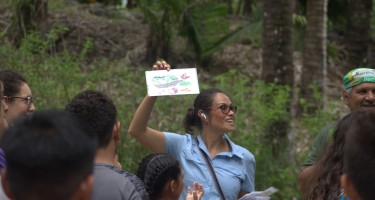From Technical Training to Transformation: Costa Rica Leads the Wave in Green Cooling
Costa Rica is at the forefront of sustainable climate-friendly refrigeration, empowering trainers with the skills, technologies, and mindset to drive real change in the cold chain.

© GIZ / Greener Reefers
The refrigeration industry is facing a pressing problem: traditional refrigerants used in refrigerated containers, so-called reefers, are major contributors to greenhouse gas emissions, intensifying climate change. To combat this, new climate-friendly technologies like carbon dioxide (CO₂) and propane (R290) refrigeration are emerging as sustainable alternatives.
However, these innovative technologies require specialized knowledge and skills that many technicians and trainers do not yet possess. This skills gap poses a significant barrier to adopting greener refrigeration methods on a large scale.
To address this challenge, a technical training program was held in Puerto Limón, Costa Rica, from August 18 to 21, 2025, as part of the Greener Reefers project within the Proklima cluster. The training was a joint initiative between the Environmental Quality Directorate of the Ministry of Environment and Energy (MINAE) and the German cooperation agency GIZ, with the support of the German Federal Ministry for the Environment.
Explore the photo gallery for a closer look at the training program.
It brought together vocational trainers, technical staff, industry experts, and project partners—including representatives from key Costa Rican educational institutions such as the Colegio Tecnico Profesional (CTP) under the the Ministry of Public Education (MEP), the National Training Institute (INA), and Fundación Samuel. The program aimed to strengthen local capacity in CO₂ refrigeration technologies by equipping trainers with the skills and knowledge needed to educate and support technicians in the transition to low-emission, energy-efficient cooling systems.
Participants emphasized the importance of gaining new skills that not only enhance their professional development but also contribute to global environmental goals. The trainings are critical for the future of the cold chain industry, ensuring compliance with international agreements such as the Kigali Amendment, which mandates the reduction of harmful refrigerants.
The Greener Reefers project, supported by the German Federal Ministry for the Environment and implemented by GIZ, plays a vital role in facilitating this shift in countries like Costa Rica and South Africa. By focusing on capacity building and technical training, the project supports the industry’s transformation towards sustainable refrigeration and a greener future.
Costa Rica’s leadership in hosting these trainings demonstrates the country’s commitment to climate action and showcases how targeted education initiatives can drive meaningful change in the refrigeration sector.
- Country: Costa Rica
- Project:
- Contact:
Kirsten Orschulok






